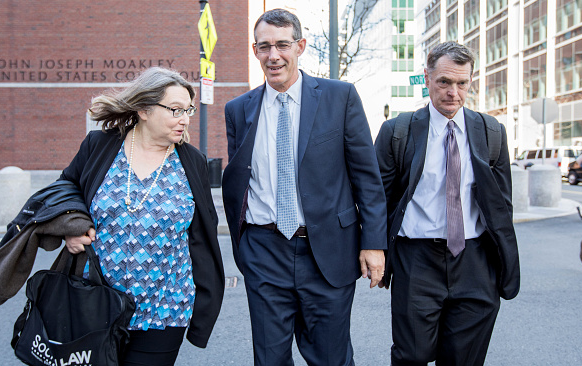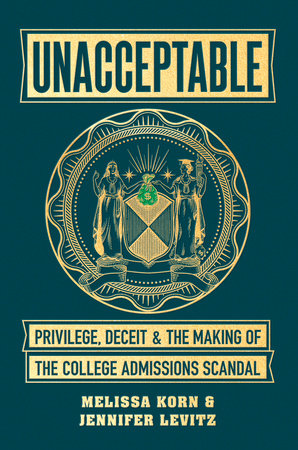You have /5 articles left.
Sign up for a free account or log in.

Michael Center, former men's tennis coach at UT Austin, leaves court last April.
Scott Eisen/Getty Images
The introduction of Unacceptable: Privilege, Deceit & the Making of the College Admissions Scandal (Penguin) features a scene on the morning of March 12, 2019. That was the day the world first learned of the college admissions scandal in which wealthy parents paid to have their children considered as athletes (they were not) or to cheat on the SAT or ACT.
"Boom boom boom went the thud of fists." It was 6 a.m. in Los Angeles, and 13 homes heard those loud knocks on their doors. It was the Federal Bureau of Investigation making arrests. Initially, many of those arrested didn't know why. Some of those arrested were given permission to change out of pajamas and into clothes. When the prisoners were gathered -- in a men's group and a women's group -- at the federal courthouse, some recognized each other. A coach who had been arrested said, "Do you all know Rick Singer?"
 At that point, the men let out a collective expletive. It was through Rick Singer that those arrested had broken the law.
At that point, the men let out a collective expletive. It was through Rick Singer that those arrested had broken the law.
And this is the story that Melissa Korn and Jennifer Levitz, two Wall Street Journal reporters, tell in the book. Many parents initially denied guilt, but 28 have since admitted guilt, and some have served jail terms. This may be the tell-all book on which people will rely for details on the case.
Rick Singer
Singer figures prominently in the book. He's the mastermind of the admissions schemes -- for which he and his phony foundations were paid.
Korn and Levitz describe Singer as someone "prone to gross exaggerations, if not outright lies." They describe how he built a career from being an assistant basketball coach/motivational speaker to a college consultant.
"Applications were soaring for all types of schools, and the colleges were touting their hyperselectivity," they write. "Parents would need to be more sophisticated to get their children into the right schools, and students would need to have a brand to sell themselves beyond their grade-point averages and extracurriculars. Families naturally rushed to Singer, a man who was almost pathologically obsessed with winning."
Singer registered his first college counseling company, the CollegeSource, in California in 2004. The model was legal -- "he would hire representatives, or 'coaches,' all over the country and work with students on college admissions and test prep, for a fee. The tutor and Singer would split that fee, fifty-fifty." Singer made house calls. "People were more comfortable in their homes, and in turn, he could see how they were living."
By 2005, he'd left the business but not college consulting. He was charging $2,500 a year -- which was a lot (in 2005).
He spoke to students and parents about yield, the percentage of admitted applicants who enroll. Yield is obviously important to colleges, but that emphasis is less well-known to students, and parents.
"Don't tell them you're confused," he told students. "Say, 'This is my first choice. USC is my whole life.'"
By 2007, he was boasting to a friend, "Do you really think they audit these applications if someone says 'My parents didn't go to college?' No, they have no way of knowing." When the friend asked if an applicant who lied would get caught, he said, "They don't get caught."
Then the authors devote space to Singer's helping the daughter of a wealthy man get admitted to Georgetown University as a tennis player (she wasn't). It earned Singer $150,000.
Singer found that he needed wealthy parents for this work -- and the authors describe how his confidence worked to win over parents, who then referred him to other parents. His phone rang on Sunday mornings, Singer said. The parents had been at dinner parties the night before and heard about other parents' children.
"At some schools, giving $10 million isn't enough because $10 million makes no impact on their school. They want 30, 40, 50 million," he is quoted as saying.
The Sources and the Seduction
The authors write that the book is based conversations with "hundreds of people," many of them anonymous. "Many of the people we interviewed were involved in ongoing legal battles at the time of our discussions. Some still have criminal cases pending," they write. "As a result, those who agreed to speak generally asked to speak on the condition that they not be identified."
The authors also detail the "seduction" of Felicity Huffman and others. Huffman, a star of Desperate Housewives, did not originally want to break the law. Singer convinced her, according to Huffman's lawyer, with a lie. Huffman's daughter wanted to attend a top-performing arts college, and Singer told her the daughter would need SAT scores of 1250, or ideally 1350, to do this. This isn't true. Her daughter's friends got accepted at top-performing arts colleges with 1100s. But he had created doubt in Huffman's mind.
First he had Huffman apply -- successfully -- to get her daughter extra time on the SAT. This was questionable but not necessarily illegal.
But then he got her permission to have her daughter's scores raised -- without her knowledge. He asked Huffman, "Are we doing this on her own or with my help?"
Huffman's answer: "With your help."
Water Polo
One of the students interviewed by name is Matteo Sloane.
"It's honestly, like, kind of gross that they're trying to live their kids' lives," Matteo says of his parents. "It doesn't give the kids the breathing room they need to grow and develop into their own person."
After his father hired Singer, Singer started to stop by and to set up tutors for him. Matteo had a range of colleges he was interested in -- the University of California, Santa Cruz; Santa Clara University; Loyola Marymount; and Georgetown.
But Matteo says that Singer steered him toward the University of Southern California. Matteo's father, Devin, got involved, but Matteo didn't understand what he was doing.
"In June 2017, [Devin] Sloane visited Amazon.com to buy water polo gear, including a ball, a Speedo swimsuit, a padded swim cap, and a vinyl Italian flag decal for the cap," the authors write.
"Later that month he posed Matteo for photos in the family swimming pool, wearing the new items and holding the ball."
While Matteo says he didn't realize what was happening, Devin Sloane agreed to write a check for $200,000 to Singer's "charity" in return for his help.
The elder Sloane was sentenced to four months in prison for what he did.
Limits on Lives of the Rich and Famous
The book provides these and many other details of Varsity Blues. Most of the cases have been decided by guilty pleas.
The authors shine attention (and shame) on the rich and famous. For instance, in discussing the first hearings before Judge M. Page Kelley, they write, "In came the scion of a Napa Valley wine dynasty renowned for its pinot noir and chardonnay. In came a Beverly Hills real estate magnate whose vast portfolio included a Moroccan-style luxury resort outside of Phoenix. And there was Greg Abbott, the preppy founder of International Dispensing Corporation, maker of the spout on ubiquitous soft box containers for soup broth and non-refrigerated creamers. Life had unraveled quickly."
The book ends with Matteo, who unlike other children in the scandal was not kicked out of USC. The book describes Matteo visiting his father in jail.
"Matteo forgave his father, and gained a new maturity and perspective," they write. "He said the college admissions scandal has exposed a larger problem of parents being too invested in their kids' lives -- and the ability to tout those children's accomplishments as their own," they write. "He also realized he hadn't spoken up enough or pushed back against the pressure-cooker environment that he and his peers were in."




